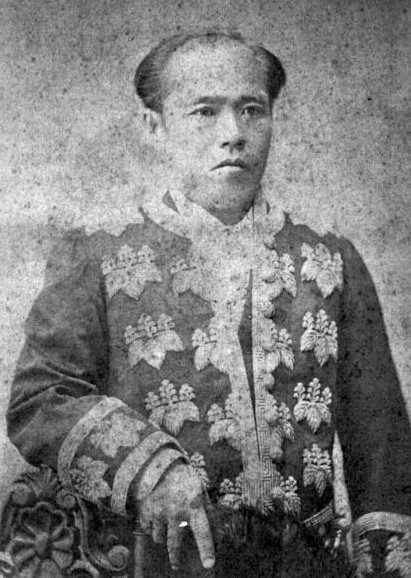|
Carl Köppen
Carl Köppen (23 August 1833 - 28 June 1907) was a German military advisor active in Japan at the start of the Meiji era. Biography A member of the Schaumburg-Lippe Jäger Battalion who rose rapidly through the ranks, Köppen was invited to teach in Japan as a foreign advisor providing training to troops loyal to the Kishū Domain The Kishū Domain (紀州藩, Kishū-han), also referred to as Kii Domain or Wakayama Domain, was a feudal domain in Kii Province, Japan. This domain encompassed regions in present-day Wakayama and southern Mie Prefecture, Mie prefectures and .... Based at Wakayama Castle between 1869 and 1871, Köppen specialized in Prussian Army drills and the use of the Doersch and von Baumgarten Needle gun. References 1833 births 1907 deaths People from Bückeburg German expatriates in Japan Foreign advisors to the government in Meiji-era Japan Foreign educators in Japan Military personnel from Lower Saxony {{Japan-bio-stub ... [...More Info...] [...Related Items...] OR: [Wikipedia] [Google] [Baidu] |
Bückeburg
Bückeburg (; Northern Low Saxon: ''Bückeborg'') is a town in Lower Saxony, Germany, on the border with North Rhine Westphalia. It is located in the district of Schaumburg close to the northern slopes of the Weserbergland ridge. Bückeburg has a population of 21,030. History Until the German Revolution of 1918–1919, Bückeburg was the capital of the tiny principality of Schaumburg-Lippe. Schaumburg-Lippe continued to be an independent German state ( Free state) until 1946. Houses began to gather around the castle and were protected by a city wall in the 17th century. In the 19th century, it was connected to the Minden and Hanover Railway and housed a synagogue. The poet J. G. von Herder was court preacher here from 1771 to 1776. Bückeburg is a former British garrison town and had a number of British residents until recently. Most of the British residents worked at the British Military Hospital (BMH) in Rinteln, or in the local English Prince Rupert School, als ... [...More Info...] [...Related Items...] OR: [Wikipedia] [Google] [Baidu] |
Lower Saxony
Lower Saxony is a States of Germany, German state (') in Northern Germany, northwestern Germany. It is the second-largest state by land area, with , and fourth-largest in population (8 million in 2021) among the 16 ' of the Germany, Federal Republic of Germany. In rural areas, Northern Low Saxon and Saterland Frisian language, Saterland Frisian are still spoken, though by declining numbers of people. Lower Saxony borders on (from north and clockwise) the North Sea, the states of Schleswig-Holstein, Hamburg, , Brandenburg, Saxony-Anhalt, Thuringia, Hesse and North Rhine-Westphalia, and the Netherlands. Furthermore, the Bremen (state), state of Bremen forms two enclaves within Lower Saxony, one being the city of Bremen, the other its seaport, Bremerhaven (which is a semi-exclave, as it has a coastline). Lower Saxony thus borders more neighbours than any other single '. The state's largest cities are the state capital Hanover, Braunschweig (Brunswick), Oldenburg (city), Oldenburg, ... [...More Info...] [...Related Items...] OR: [Wikipedia] [Google] [Baidu] |
Neumünster
Neumünster () is a city in the middle of Schleswig-Holstein, Germany. With more than 79,000 registered inhabitants, it is the fourth-largest municipality in Schleswig-Holstein (behind Kiel, Lübeck and Flensburg). The ''Holstenhallen'' and the ''Stadthalle'' make the city an important trade fair location. History The city was first formally mentioned as ''Wippendorp im Gau Faldera'' in 1127. In that year, the Bishop Vicelinus was sent there by the Archbishop of Bremen to perform missionary work. By 1136, Vicelinus built a new monastery there (Latin: ''novum monasterium,'' Greco-Latin'': Neomonasterium,'' German'': neues Kloster'' or ''neues Münster''). The name "Novum monasterium" eventually replaced the previous names of Wippendorf and Faldera and led to the current name. In April 1870, Neumünster received town privileges. Since 1903 Neumünster is a so-called "independent city" (German: ''Kreisfreie Stadt'') as it is not part of a district (German: ''Kreis''). Gro� ... [...More Info...] [...Related Items...] OR: [Wikipedia] [Google] [Baidu] |
Meiji Era
The was an Japanese era name, era of History of Japan, Japanese history that extended from October 23, 1868, to July 30, 1912. The Meiji era was the first half of the Empire of Japan, when the Japanese people moved from being an isolated feudalism, feudal society at risk of colonization by Western world, Western powers to the new paradigm of a modern, industrialized nation state and emergent great power, influenced by Western scientific, technological, philosophical, political, legal, and aesthetic ideas. As a result of such wholesale adoption of radically different ideas, the changes to Japan were profound, and affected its social structure, internal politics, economy, military, and foreign relations. The period corresponded to the reign of Emperor Meiji. It was preceded by the Keiō era and was succeeded by the Taishō era, upon the accession of Emperor Taishō. The rapid modernization during the Meiji era was not without its opponents, as the rapid changes to society cause ... [...More Info...] [...Related Items...] OR: [Wikipedia] [Google] [Baidu] |
Principality Of Schaumburg-Lippe
Schaumburg-Lippe, also called Lippe-Schaumburg, was created as a county in 1647, became a principality in 1807 and a free state in 1918, and was until 1946 a small state in Germany, located in the present-day state of Lower Saxony, with its capital at Bückeburg, an area of and over 40,000 inhabitants. History Schaumburg-Lippe was formed as a county in 1647 through the division of the County of Schaumburg by treaties between the Duke of Brunswick-Lüneburg, the Landgrave of Hesse-Kassel and the Count of Lippe. The division occurred because Count Otto V of Holstein-Schaumburg had died in 1640 leaving no male heir. Initially Schaumburg-Lippe's position was somewhat precarious: it had to share a wide variety of institutions and facilities with the County of Schaumburg (which belonged to Hesse-Kassel), including the representative assembly and the highly productive Bückeberg mines, and the Landgrave of Hesse-Kassel retained some feudal rights over it. It was further threaten ... [...More Info...] [...Related Items...] OR: [Wikipedia] [Google] [Baidu] |
Oyatoi Gaikokujin
The foreign employees in Meiji Japan, known in Japanese as ''O-yatoi Gaikokujin'' (Kyūjitai: , Shinjitai: , 'hired foreigners'), were hired by the Japanese government and municipalities for their specialized knowledge and skill to assist in the modernization of the Meiji period. The term came from ''Yatoi'' (a person hired temporarily, a day laborer), was politely applied for hired foreigner as ''O-yatoi gaikokujin''. The total number is over 2,000, probably reaches 3,000 (with thousands more in the private sector). Until 1899, more than 800 hired foreign experts continued to be employed by the government, and many others were employed privately. Their occupation varied, ranging from high salaried government advisors, college professors and instructor, to ordinary salaried technicians. Along the process of the opening of the country, the Tokugawa Shogunate government first hired German diplomat Philipp Franz von Siebold as diplomatic advisor, Dutch naval engineer Hendrik Hardes ... [...More Info...] [...Related Items...] OR: [Wikipedia] [Google] [Baidu] |
Kishū Domain
The Kishū Domain (紀州藩, Kishū-han), also referred to as Kii Domain or Wakayama Domain, was a feudal domain in Kii Province, Japan. This domain encompassed regions in present-day Wakayama and southern Mie Prefecture, Mie prefectures and had a substantial income of 555,000 koku. The administrative center of the domain was located at Wakayama Castle, which is situated in present-day Wakayama (city), Wakayama, Wakayama Prefecture. History After the Battle of Sekigahara in 1600, Asano Yukinaga, the lord of Kai Province, was granted Kii Province. This led to the establishment of the Kishu Domain, which governed the Asano clan of Tozama. However, in 1619, the Asano clan was relocated to the Hiroshima Domain in Aki Province under the leadership of Fukushima Masanori. At the same time, Tokugawa Yorinobu, the tenth son of Tokugawa Ieyasu and the former lord of the Sunpu Domain, merged the former territory of Asano with 555,000 koku. This expansion included Minami Ise and Kishu, wh ... [...More Info...] [...Related Items...] OR: [Wikipedia] [Google] [Baidu] |
Wakayama Castle
260px, Layout of the ''tenshu'' is a Japanese castle located in the city Wakayama, Wakayama Prefecture, Japan. For most of the Edo Period, it was the administrative center of Kishū Domain, which was controlled by a cadet branch of the Tokugawa clan. Due to its size and status, Wakayama Castle was ranked as one of the most important castles under the Tokugawa shogunate. Although the castle was designated a National Historic Site in 1931, the original ''Tenshu'' and buildings were all destroyed by US bombing campaigns during the Pacific War. The current structures were rebuilt in concrete in 1958. The Nishi-no-Maru Garden was designated a National Place of Scenic Beauty in 1987. History During the Muromachi period, Kii Province was ruled by the Hatakeyama clan, which also controlled neighboring Kawachi and Izumi provinces; however, the political situation in Kii Province was complex, with large portions of the province under the effective control of armed monks under th ... [...More Info...] [...Related Items...] OR: [Wikipedia] [Google] [Baidu] |
1833 Births
Events January–March * January 3 – The United Kingdom reasserts British sovereignty over the Falkland Islands in the South Atlantic Ocean. * February 6 (January 25 on the Greek calendar) – Prince Otto Friedrich Ludwig of Bavaria arrives at the port of Nafplio to assume the title King Othon the First of Greece * February 16 – The United States Supreme Court hands down its landmark decision of Barron v. Mayor and City Council of Baltimore. April–June * April 1 – General Antonio López de Santa Anna is elected President of Mexico by the legislatures of 16 of the 18 Mexican states. During his frequent absences from office to fight on the battlefield, Santa Anna turns the duties of government over to his vice president, Valentín Gómez Farías. * April 18 – Over 300 delegates from England, Scotland, Wales and Ireland travel to the office of the Prime Minister, the Earl Grey, to call for the immediate abolition of slavery throughout the British Empire. * May 6 ... [...More Info...] [...Related Items...] OR: [Wikipedia] [Google] [Baidu] |
1907 Deaths
Events January * January 14 – 1907 Kingston earthquake: A 6.5 Mw earthquake in Kingston, Jamaica, kills between 800 and 1,000. February * February 9 – The " Mud March", the first large procession organised by The National Union of Women's Suffrage Societies ( NUWSS), takes place in London. * February 11 – The French warship ''Jean Bart'' sinks off the coast of Morocco. * February 12 – The steamship ''Larchmont'' collides with the ''Harry Hamilton'' in Long Island Sound; 183 lives are lost. * February 16 – SKF, a worldwide mechanical parts manufacturing brand (mainly, bearings and seals), is founded in Gothenburg, Sweden. * February 21 – The English mail steamship ''Berlin'' is wrecked off the Hook of Holland; 142 lives are lost. * February 24 – The Austrian Lloyd steamship ''Imperatrix'', from Trieste to Bombay, is wrecked on Cape of Crete and sinks; 137 lives are lost. March * March ** The steamship ''Congo'' collides ... [...More Info...] [...Related Items...] OR: [Wikipedia] [Google] [Baidu] |
People From Bückeburg
The term "the people" refers to the public or common mass of people of a polity. As such it is a concept of human rights law, international law as well as constitutional law, particularly used for claims of popular sovereignty. In contrast, a people is any plurality of persons considered as a whole. Used in politics and law, the term "a people" refers to the collective or community of an ethnic group or nation. Concepts Legal Chapter One, Article One of the Charter of the United Nations states that "peoples" have the right to self-determination. Though the mere status as peoples and the right to self-determination, as for example in the case of Indigenous peoples (''peoples'', as in all groups of indigenous people, not merely all indigenous persons as in ''indigenous people''), does not automatically provide for independent sovereignty and therefore secession. Indeed, judge Ivor Jennings identified the inherent problems in the right of "peoples" to self-determination, as i ... [...More Info...] [...Related Items...] OR: [Wikipedia] [Google] [Baidu] |







